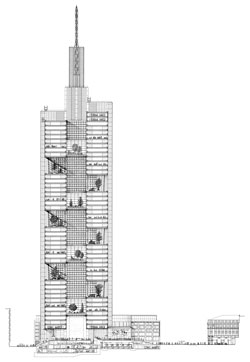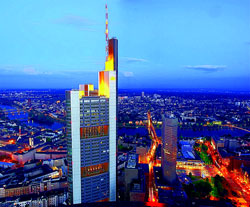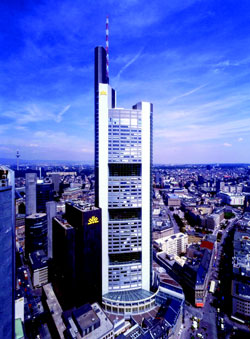Commerzebank Tower, a sustainable obelisk
|
Commerzbank Tower, head office of Commerzebank, a leading bank in Germany and Poland
is an outstanding architectural landmark of the financial capital Frankfurt. This
remarkable building, designed by Lord Norman Foster, founder and chairman, Foster+Parnters
has been a feature on Frankfurt's skyline since 1997 and is considered an excellent
example of environmentally-friendly and energy-saving architecture.
When construction completed on the 53-story Commerzbank Headquarters in 1997 it
set out as the tallest building in Europe, but what made it innovative, was its
combination of form, ingenuity and technical expertise to create an entirely new
building type: the humane and socially responsible skyscraper. The Commerzbank Tower
has air conditioned structures with a central service core and identical, spatially
separated floors; Commerzbank tower is flooded with daylight and naturally ventilated,
has a full-height atrium, and four-storey landscaped gardens evenly distributed
over
|
 |
the height of the building. Working in combination, these architectural elements
unlock the internal space of Commerzbank, transforming the entire work environment.
While Commerzbank Tower has a distinctive presence on the Frankfurt skyline, it
is also fastened into the lower-scale city fabric, with restoration and rebuilding
of perimeter structures reinforcing the original scale of the block. The developments
at street level provide shops, car parking, apartments and a banking hall, and forge
links between the Commerzbank and the broader community. At the heart of the scheme
is a public galleria with restaurants, cafes and spaces for social and cultural
events.
 |
Considered to be the world's first ecological office tower, Commerzbank Headquarters
relies heavily on passive strategies to create a pleasant work environment for its
occupants. These strategies include a triangular (doughnut) floor plan, sky gardens,
and a full-height atrium that allows for every office in the tower to have operable
windows for views, natural ventilation, and daylight. The four-storey sky gardens
(which spiral up the sides of the tower) provide fresh air and allow for passive
solar gain, while the central atrium space acts like a natural ventilation chimney
for the inward-facing offices. A computer controlled building management system
decides whether passive or active systems are most appropriate for use at a given
time and adjusts openings and shading devices accordingly. Commerzbank tower also
uses water, instead of air, to condition the building, which saves a tremendous
amount of energy over the life of the building.
Green Building Frankfurt
|
The Commerzbank tower was well ahead of its time when it was built, and not just
architecturally. The tower, which has been a landmark on the Frankfurt skyline ever
since, is also a leading example of environmentally-friendly and energy-saving architecture.
Commerzbank received the ‘Green Building Frankfurt’ award in 2009 in
recognition of the building's pioneering role.
A feature that makes the building unusual throughout the world is its framework
construction, which allows the integrated tower gardens to be stretched over the
upper levels without support. Each of these ‘green lungs’ features a
different type of vegetation (Mediterranean, Asian, etc.).
At the same time, the gardens are part of a special ventilation system; a double-shell
climate façade encloses the glass tower. Through openings in the outer shell,
fresh air enters the space in the façade, while the windows of the
|
 |
inner shell can be closed or opened individually by the employees. One of the main
reasons as to why Commerzbank Tower is considered to be the first “ecological
skyscraper” is that passive strategies are utilized at all scales ranging
from window detailing to the full-height atrium. Typically, modern office buildings
full of heat-producing machinery have a higher demand for cooling, but Frankfurt
winters typically require heating as well.
Commerzbank has multiple other systems in place to lower energy consumption and
improve its sustainability. With the building’s high insulation quality and
abundance of glazing, heat is provided through 3 conventional radiators located
at the sides of the windows. The cooling system, however, is far more innovative.
Cool water – absorbed through environmentally friendly refrigerating machines
attached to municipal streams - is pumped through tubes in the ceiling panels and
cools the building down without resorting to energy-intense air conditioning. Water
has a high capacity for absorbing heat and moving it around uses less energy than
circulating air, which needs to be constantly replaced.
Facts
Official Name: Commerzbank Tower
Country
: Germany
City: Frankfurt
Building Function: Office
Structural Material: Composite
Start of Construction: 1994
Completion: 1997
Global Ranking: #173 tallest in the World
Regional Ranking: #6 tallest in Europe
National Ranking: #1 tallest in Germany
City Ranking: #1 tallest in Frankfurt am Main
Height: Architectural 259.0 meter / 850 feet
Height: Occupied
190.0 meter / 623 feet
Height: To Tip 300.0 meter / 984 feet
Floors Above Ground: 56
Floors Below Ground: 2
Number of Elevators: 25
Tower GFA: 108,000 m² / 1,162,502 ft²
Companies Involved
Owner: Commerzbank
Developer: Commerzbank
Design Architect: Foster + Partners
Structural Engineers: Arup
Krebs und Kiefer
MEP Engineers: J. Roger Preston Group;
Schad and Holzel;
Project Manager: Nervus Gmbh
Main Contractor: HOCHTIEF Construction AG Niederlassung Hamburg
Other Consultants: RWDI, AECOM
Source: John Arend, Mike Benkert, Audrey de Filippis, Saretta
Tillmaand and CTBUH